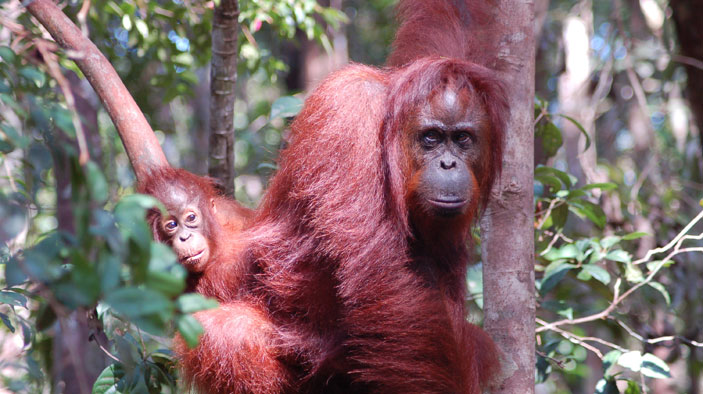Indonesia—Orangutan Conservation Services Program (OCSP)
Client: U.S. Agency for International Development
Duration: 2007-2010
Region: Asia and the Pacific
Country: Indonesia
Solutions: Environment
The Orangutan Conservation Services Program (OCSP) addressed the major threats driving orangutan extinction: forest conversion, unsustainable logging, and wildlife trafficking. To do so, the project formed and strengthened partnerships with 40 international and local organizations, private sector partners, government institutions, and communities, which together supported the design and establishment of best management practices for key habitat conservation of wild orangutan populations.

Sample Activities
- Support the first revision in 20 years of nine major national laws and regulations that combat habitat destruction and strengthen community monitoring of illegal forest activities.
- Generate private sector support for orangutan conservation.
- Conduct aggressive communications raising awareness of the importance of forest conservation for biodiversity preservation and climate change issues.
Select Results
- Active in 3.5 million hectares, covering 40 percent of Indonesia’s orangutan habitat, the project improved management of 1.3 million hectares critical for orangutans and many globally important species.
- Convened key actors across various sectors to provide input into the Ministry of Forestry’s National Orangutan Strategy and Action Plan 2007–2017, which was announced by the Indonesian President at the United Nations Climate Change Conference in Bali in 2007, and commits the Indonesian government to stabilizing all orangutan populations by 2017.
- A key victory in East Kalimantan saw the indigenous Dayak people of Wehea awarded Indonesia’s highest environmental honor for protecting and managing 38,000 hectares of rainforest from lowland to mountain. The area—an important water and medicinal plant source for the Wehea people and home to 500 to 750 orangutans—was declared protected by the local government, which helped fund its management while private firms helped fund infrastructure.
Featured Links
RELATED CONTENT:
Nepal—USAID Biodiversity (Jal Jangal)
Working in the Gandaki and Karnali river basins, this activity focuses on improving ecosystem health, advancing environmental and social safeguards, promoting climate resilience, and addressing environmental crime in Nepal.
Read More